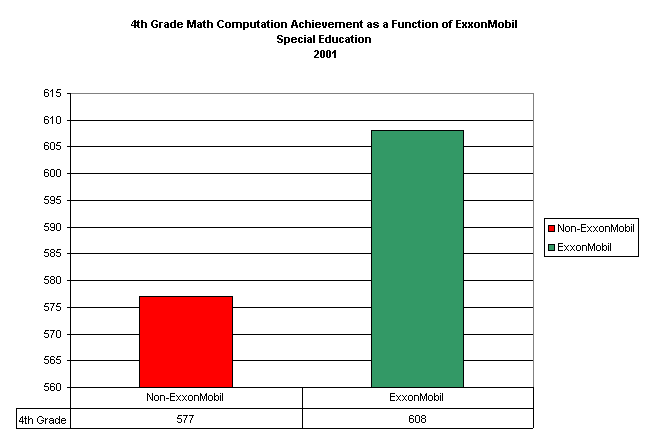

 |
 |
![]()
 |
Working Group Session # 15 - Donna Little-Kuamo
|
Albuquerque Public Schools is a large urban school district serving more than 86,000 students. The district is impacted by issues of poverty and limited English Proficiency. 52% of its elementary schools are eligible for free and reduced lunch and 64% of its households earn less than 25,000 annually. Serving all students requires thoughtful and unique approaches.
For the past decade the Albuquerque ExxonMobil Assessment project has developed a level of professional engagement that is truly enhancing student success in the mathematics classroom. The initial focus was the mismatch participating teachers perceived between what they knew from their college preparation and what they needed to know to become truly effective teachers of mathematics. In the beginning the project participants centered their work on the exploration of curriculum and children. This initial examination developed interest and a need for teachers to develop their own mathematics.
To address the content of the teachers the group began to seek mathematicians to support their professional study. The road was a bit bumpy in the beginning because teachers began to seek instruction that was modeled around building deep connections much like they wanted for the students in their classrooms. In other words, they wanted their content to be delivered much like it should be delivered in the classroom. The teachers wanted to make the same strong connections that children should make in a quality mathematics classroom. The commitment and of the group has held the project to keep a high level of attention to the strategies and approaches used to build teacher content knowledge and the examination of students developing mathematical ideas. In an effort to extend the work, the small enthusiastic group of teacher pushed the project to a structure of building capacity at the school level. The mathematics specialist/ teacher leader model was born.
Teacher leaders from 30 elementary schools meet approximately 14 evenings per school year. The teacher leaders participate in professional development that addresses teacher content knowledge alongside a deep study of children developing mathematical ideas. Each teacher leader facilitates a study group at their individual schools that extends the project to supporting about 250 teachers a year.
In recent years, the study of mathematics content and children guided the project to look deeply at the mathematics of children and moved the project to developing and using rich assessments to uncover the mathematical development of children. During the past 5 years the Albuquerque Project has maintained the level of teacher content study while becoming deeply involved in examining student work through rich non-routine mathematics assessments.
The current Albuquerque Public Schools Mathematics assessment Project is structured around on going professional development with all pieces contributing to a common direction and purpose, tying instruction and assessment together. The teachers engage in mathematical study with rich professional development materials such as Developing Mathematical Ideas (DMI). Albuquerque has been a pilot site for several DMI modules including: Building a System of Tens, Making Meaning of Operations, Measuring Space in One, Two and Three Dimensions and Working With Data.
All teachers who were new to the project participated in a one-day, initial training in math performance assessment. Teachers are introduced to assessment terms and concepts, with a focus on performance assessment. They worked problems, examined student work, and used the district rubric to score student work.
Study groups hold monthly meetings at the school site. Study groups range in size from groups of five to sixteen teachers. Some teacher leaders sponsor more than one study group.
Throughout the year teacher leaders are very much involved and are influential in leading discussions, planning and implementation of newly adopted NSF funded mathematics materials. In addition, many of our teacher leaders now serve as trainers for the districtís new Math standards. These opportunities provided our teacher leaders with an avenue to interact and inform upper levels of administration.
Results
The continual and thoughtful support of elementary teachers in Albuquerque has provided meaningful and impressive results. The project has developed effective strategies for continuing to provide teachers with ongoing content support and thoughtful effective study around children and their mathematical development.
The project has begun to look at student performance over time. Included are results comparing 1999-2000 and 2000-2001. Data from the 2000-2001 school year was analyzed with a process known as Hierarchal Linear Model (HLM). This type of analysis allows for control of factors such as socio economics and prior achievement therefore enabling us to look more closely at the relationship of teaching to student performance.
Albuquerque Public Schools has taken notice of the success of the project and are beginning to engage in steps of extending aspects of the project to serve all 126 schools in the district.
![]()
The Albuquerque Project is designed to invest over time in teachers. Teachers who study over a long period of time make a significant difference in student performance.
|
New Teachers Leaders are described as those participating for 1 or 2 years. | |
|
Experienced Teacher Leaders are described as those participating for 3 or more years. |

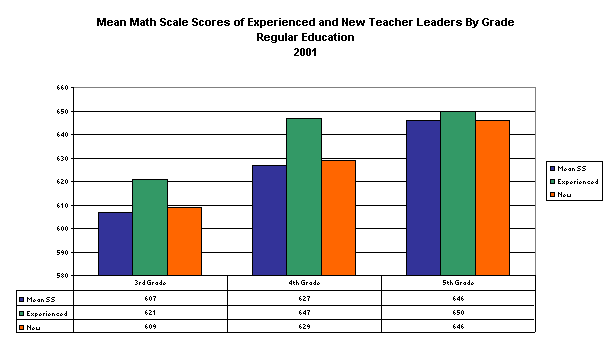
Two Year results demonstrate the progress of ExxonMobil Special Education students:
In 2000, 71% of 3rd grade ExxonMobil special education students perform better than non-ExxonMobil peers. In 2001, 90% of 3rd grade ExxonMobil special education students out perform non-ExxonMobil peers.
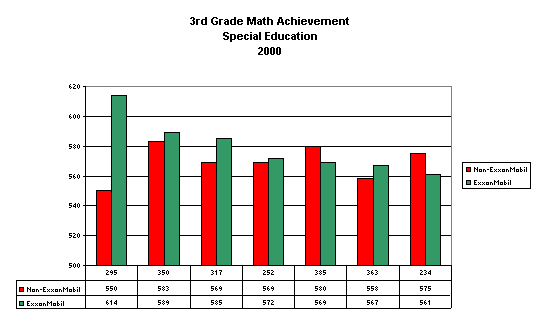
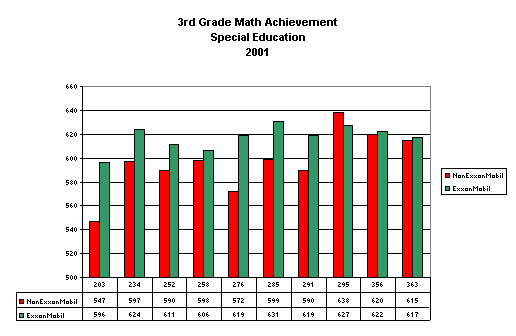
In 2000, 77% of 4th grade ExxonMobil Special Education Students scored higher than non-ExxonMobil peers. In 2001, 71% of 4th grade ExxonMobil Special Education Students scored higher than non-ExxonMobil peers.
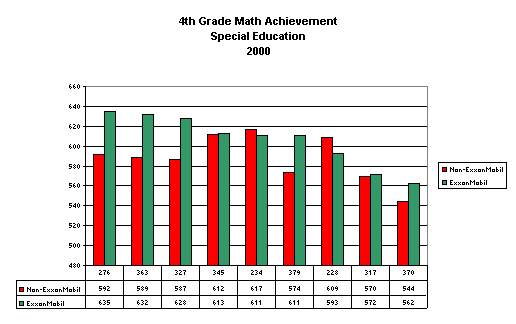
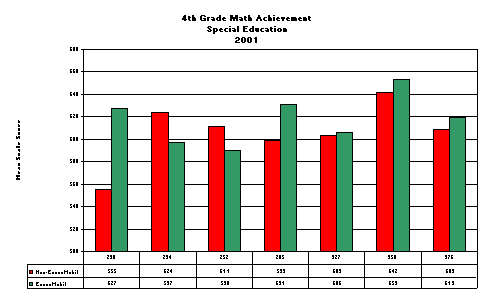
In 2000, 72% of the 5th grade students taught by ExxonMobil Teachers score higher than non-ExxonMobil peers.
In 2001, 77% of the 5th grade students taught by ExxonMobil teachers score higher than
Non-ExxonMobil peers.
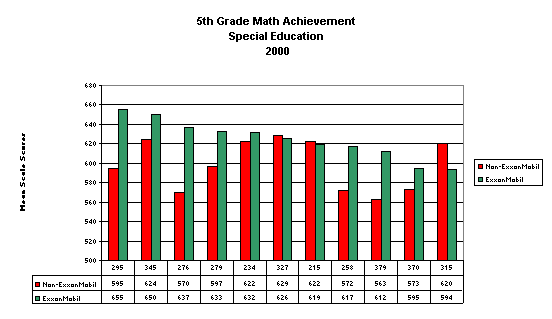
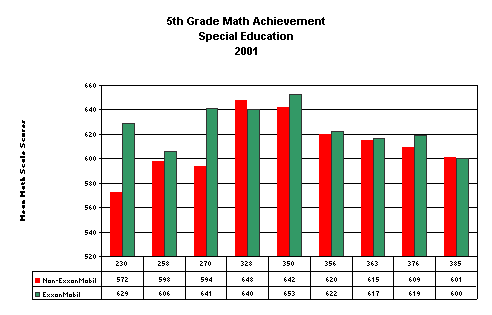
Efficiency of computation remains high with students who participate in classrooms taught by ExxonMobil Teachers. 4th grade special education students demonstrate particularly striking results during year 2000-2001.
